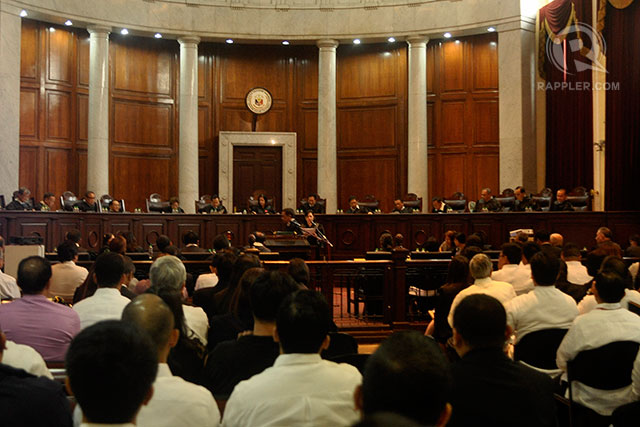SUMMARY
This is AI generated summarization, which may have errors. For context, always refer to the full article.

MANILA, Philippines – Manila Electric Company (Meralco) asked the Supreme Court (SC) on Tuesday, February 4, to lift the temporary restraining order (TRO) and deny the request for injunction on its record-high power rate hike.
Meralco’s lawyers, retired SC Justice Florentino Feliciano and Victor Lazatin, said the petitioners were raising regulatory issues, so these could have been addressed by the Energy Regulatory Commission (ERC). (READ: Meralco to defend price hike before SC)
“Rather than petitioning the ERC as the law allows, petitioners came to the High Court,” said Feliciano.
Lazatin said raising the issue to the ERC was “a speedy recourse available to petitioners, yet petitioners chose to appeal to the High Court.”
Meralco was set to implement in December a rate increase of P4.15 per kilowatt-hour rate, the highest in history. This was after the simultaneous shutdown of its suppliers forced it to purchase more power from the Wholesale Electricity Spot Market (WESM) at high prices.
The power distributor was supposed to impose the increase in 3 tranches starting December, but the SC issued a TRO, granting the petition of groups, which claimed the hike was against public interest.
The High Court is looking into allegations of collusion among power players and the failure on the part of regulators to protect consumers.
Meralco’s lawyers echoed a point previously raised by Justice Marvic Leonen on the first day of the oral arguments. (READ: Meralco inflated charges, SC told)
Leonen asked the petitioners if appealing to the SC was the appropriate remedy for the matter. “Have you complied with requirement of exhaustion of all administrative remedies?”
But petitioners – represented by lawyers Neri Colmenares, Leonard de Vera, and Carlos Zarate – maintained that the issue was “imminent” and required court intervention.
They also cast doubt on ERC’s ascendancy as regulator, saying it was the one that approved the rate hike to begin with.
Congressional issue
Feliciano also argued that concerns raised by petitioners regarding the law governing the power sector, the Electric Power Industry Reform Act of 2001 or EPIRA, will be best addressed by Congress and not by the SC.
In their case, the petitioners asked the SC to declare as unconstitutional sections 6 and 9 of EPIRA, saying these exempted power generation and distribution companies from ERC regulation by failing to classify them as public utilities.
They later on struck this down from their case after Chief Justice Maria Lourdes Sereno explained that said companies were still subject to ERC regulation even if they are privately held.
Feliciano agreed that the question is not if said companies are regulated, but how they should be regulated.
The extent of regulation as outlined in EPIRA are matters of policy, he said, that Congress has jurisdiction over.
‘Did everything it could’
Meralco’s lawyers further argued that the utility firm “took measures to mitigate the effects of the shutdowns of several power plants and the resulting increase in generation charges” even when it was not required by law. The measures came in the form of staggered billing of Meralco customers.
They added that it was tied down by WESM rules.
Meralco has been criticized for helping inflate prices in the spot market by asking power generation company Therma Mobile Incorporated to bid supply contracted to the utility firm at the maximum amount of P62/kWh.
Lazatin explained that Meralco did this as part of a strategy to prevent power from Therma from being dispatched.
Lazatin said that under the “must-offer” rule of WESM, Therma was required to bid out even the capacity it already promised Meralco under a bilateral supply contract.
WESM prices fluctuate on an hourly basis depending on bids offered by power suppliers. These bids are ranked from lowest to highest, with the lowest the first to be dispatched. The highest bid price, however, becomes the “market clearing price,” which is paid to the suppliers.
If the TRO continues, Meralco warned there will be rotational blackouts by the summer, when demand usually peaks and there isn’t enough supply of cheap power like hydro. (READ: ‘TRO on price hike puts Meralco at risk’)
Meralco has asserted that it is just collecting from its customers the charges billed by its suppliers and “it does not derive a single centavo of profit” from the passed-on charges.
If an injunction will be issued against Meralco’s rate hike, its lawyers said generation companies should also be prevented from billing Meralco. – Rappler.com
Add a comment
How does this make you feel?
There are no comments yet. Add your comment to start the conversation.